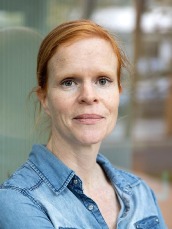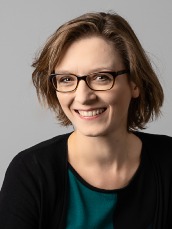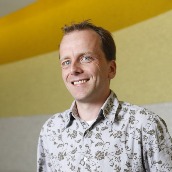Vici grants for four researchers
The Dutch Research Council (NWO) has awarded four Vici grants, worth up to €1.5 million each, to four UG and UMCG researchers. Marleen Kamperman, Lisa Herzog, Ming Cao and Floris Foijer can use this money to develop an innovative line of research and to set up their own research groups for a period of five years.

Marleen Kamperman
The research for which Prof. Kamperman (Faculty of Science and Engineering) has been awarded a Vici grant concerns (bio)polymers. The threads produced by velvet worms are remarkably sticky and stiff; the beak of a jumbo squid is extremely hard; and spider silk is incredibly tough. To make these extraordinary materials, nature uses fluidic phase-separated biopolymers, or coacervates, as intermediates during processing. Gradual solubility changes transform the fluids into their final solid state. Researchers aim to mimic these natural processing strategies using microfluidic systems to develop an aqueous-based, highly controlled and environmentally benign processing strategy for (bio)polymers.

Lisa Herzog
The grant awarded research project of Prof. Herzog (Faculty of Philosophy) investigates how democracies should understand and organize work. This project draws on empirical and philosophical analyses of non-standard forms of work – digital, precarious, and migrant work – to analyze current developments and their implications for democracy. It also addresses the unresolved question about the relation between paid and unpaid work and draws on the history of ideas, to develop a democratic philosophy of work, in dialogue with societal actors, that can inform labor market regulation from a democratic perspective.

Ming Cao
Awarded research conducted by Prof. Cao (Faculty of Science and Engineering) concerns the decision making process of autonomous robots. With autonomous machines becoming ubiquitous in industry and daily life, we should be able to control the way these systems make decisions. This project draws inspiration from social animals (biology), competitive human behaviors (marketing), and collective opinion formation (sociology). Employing a multi-disciplinary approach, we will improve decision-making processes of autonomous robots working in teams, especially when they are frequently influenced by stochastic perturbations. The project will improve the control of autonomous robots, broaden the application of robot teams, and benefit smart factories and digital societies in the long run.

Floris Foijer
The grant awarded to Prof. Foijer (UMCG) is for his research on cancer cells. Cancer cells frequently undergo errors when segregating their chromosomes. Our prior work shows that such errors in healthy cells activate the immune system, but that sloppy cancer cells do not. We investigate how these cells duck immune recognition, ultimately to identify ways to re-awake the immune system to clear them.
NWO Talent Scheme
NWO’s Talent Scheme consists of the Vici, Veni and Vidi grants. The Vici grant targets senior researchers who have successfully demonstrated the ability to develop their own innovative lines of research. In doing so, they have also supervised young researchers. Researchers who receive a Vici grant have the opportunity to further develop their research group, often in anticipation of a tenured professorship, if they do not already have one.
More news
-
27 January 2026
ERC Proof of Concept grant for Maria Loi
-
26 January 2026
Science for Society | The AI chip of the future
